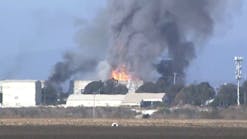Recently, I was speaking with one of my best professional friends, Paul Davis, the CEO and creator of the Firefighter Combat Challenge (www.firefighterchallenge.com). The event celebrated its 20th year in November in Myrtle Beach, SC. If ever there was a pure and pristine example of marketing to lead and support the fire service, this is it. As we discussed the growing success of the Combat Challenge, I thought about what an awesome, yet intimidating responsibility and privilege every firefighter possesses just to be a firefighter. The message: Never take this privilege for granted.
Very few people have any idea just how difficult it is to become a firefighter in our country. This is yet another reason why marketing is so important for the profession. The fact is that fire protection is a service business. Marketing and service are part of the same equation. If we remember that the definition of marketing is exchange for mutual gain, then it is a short walk to delivering on the expectations of that exchange. The brand “fire department” conveys certain expectations.
A key expectation is that we are the organization anybody in our country can call to get help for any problem they deem an emergency 24/7. We all know the term “emergency” has a very wide range of definitions, but emergency and need for service are in the eyes of the customer and citizen, not ours. It is this emphasis on the people we serve that ensures our future and the privilege to serve.
Service is the foundation of marketing and relationships create the structure. Consider the number of overlapping relationships in our fire and life safety protection system. These relationships drive our ability to get any job done or to achieve any outcome. Such stakeholders include firefighters, officers, elected officials, collateral agencies (water and police departments, public works and building departments), unions and regulatory agencies. How we manage these relationships is, in many ways, the single most important aspect of any marketing approach.
Customer service is more than a specific system; it is a mindset. It is the mechanism that grows the department’s relationships with the community it protects. It is important to establish a specific departmental procedure for receiving communications from the public, organizations, institutions and businesses the department protects. Every complaint and inquiry must be handled professionally and with a consistent thought: “How can this communication add value to the community and the department? What new opportunity to serve could this represent for our department?” These may be new, burgeoning elements of a marketing campaign. Some progressive departments are actually assigning personnel to “customer care” during an incident as part of the Incident Command System (ICS) procedure.
An educated and informed public is our most important asset; and service maintains it. People are more likely to support – politically and financially – that which they understand and, especially, what they value. If citizens do not see what we offer as valuable, they will question its need. This is especially true for a public service that receives its support from hard-earned tax dollars.
It is our responsibility to make certain we manage our customers’ expectations of our service so that they understand the vital necessity and value it provides for the quality of their lives. The discipline of fire and emergency services marketing management is the central tool that can support any department’s efforts to maintain and thrive in the community. Some observers portray the fire service as resistant to change or unenlightened when it comes to defining its own future. The argument contends we must let go of the past so that we can embrace a new vision of our future. This is only partially true.
The traditions, history, motivation and systems of the present American fire service provide the very strengths and foundations for its future. Understanding the emerging needs of our markets and the critical aspects of service to fulfill those needs will ensure that we continue to have the privilege to serve the public as firefighters.
BEN MAY, a Firehouse® contributing editor, has been developing the discipline of marketing management for the fire and emergency services for more than 25 years. He has been a firefighter for Montgomery County, MD, Fire and Rescue and fire commissioner for the Woodinville, WA, Fire and Rescue. He has been a vice president of two international marketing firms over the last 25 years, and now is responsible for business development for the Walt Disney Co., where he created the largest public fire education experience in the world, “Where’s the Fire?”, presented by Liberty Mutual Insurance Co.






